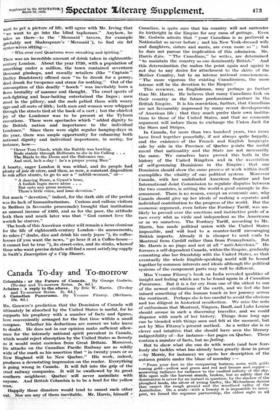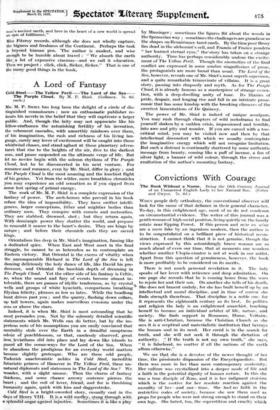Canada To-day and To-morrow
Columbia : or the Future of Canada. By George Godwin. (To-day and To-morrow Series. 2s. 6d.) Ma. GODWIN'S prediction that the Dominion of Canada will ultimately be absorbed by the United States is useful, for he supports his prophecy with a number of facts and figures, here conveniently arranged for the first time within a small compass. Whether his deductions are correct we take leave to doubt. He does not in our opinion make sufficient allow- ance for the intensely national spirit prevalent in Canada, which would reject absorption by the United States as fiercely as it would resist coercion from Great Britain. Moreover, his attacks on the Canadian Pacific Railway are as wildly wide of the mark as his assertion that " in twenty years or so New England will be New Quebec." His work, indeed, produces a devastating impression on the reader. Everything is going wrong in Canada. It will fall into the grip of the cruel railway companies. It will be swallowed by its great southern neighbour. Quebec will never assimilate with anyone. And British Columbia is to be a land for the yellow man.
Happily these disasters would tend to cancel each other out. Nor are any of them inevitable. Mr. Harris, himself a Canadian, is quite sure that his country will not surrender its birthright in the Empire for any mess of pottage. Even
Mr. Godwin admits that " your Canadian is as perfervid a Nationalist as never before ; and his New York-dressed wife and daughters, sisters and aunts, are even more so " ; but he does not pursue the implication of this admission. Mr. Harris dies. " The Canadians," he writes, are determined "to maintain the country as one dominantly British." And this determination (he makes the point again and again) is not due to any desire for attachment to the skirts of the Mother Country, but to an intense national consciousness. " The more vigorous the existing Canadianism, the more intense will be the devotion to the Empire." This reviewer, an Englishman, may perhaps go further than Mr. Harris. He believes that many Canadians look on their country as the future predominant partner in the British Empire. It is his conviction, further, that Canadians are not favourably impressed by many recent developments of American life ; that they much prefer their own institu- tions to those of the United States, and that no economic argument will induce them to exchange the Union Jack for the Stars and Stripes.
In Canada, for more than two hundred years, two races have lived together peacefully, if not always quite happily, and the existence of the French and English languages side by side in the Province of Quebec paints the useful moral that nationality and the State are not necessarily the same. We ourselves have proved this both in the history of the United Kingdom and in the association of self-governing Dominions in the Empire ; that one Dominion should show the same process at wark within itself exemplifies the vitality of our. political system. Moreover Canada, with her undefended American frontier and her International Joint Commission to regulate disputes between the two countries, is setting the world a good example in dis- armament. There is no reason, except an economic one, why Canada should give up her ideals of making a separate and individual contribution to the progress of the world. But the economic argument, even before the Fordney Tariff, was un- likely to prevail over the emotions and instinctive pride of a race every whit as virile and independent as the Americans or as we ourselves. The Fordney Tariff, according to Mr. Harris, has made political union with the United States impossible, and will lead to a counter-tariff encouraging British imports. Already it is cheaper to send coals to Montreal from Cardiff rather than from Pennsylvania. But Mr. Harris is no jingo and not at all " anti-American." He foresees a self-dependent Canada, within the Empire, gradually cementing also her friendship with the United States, so that eventually the whole English-speaking world will be bound together by common interests and ideals although the political systems of the component parts may well be different.
Miss Yvonne Fitzroy's book on India revealed qualities of insight and feeling which are to be found again in A Canadian Panorama. But it is a far cry from one of the oldest to one of the newest civilizations of the earth, and we feel she has missed something of the human touch in her journey across the continent. Perhaps she is too careful to avoid the obvious and too diligent in historical recollection. We miss the note of enthusiasm that Montreal, Niagara, Banff, and Lake Louise should arouse in such a discerning traveller, and we could dispense with much of her history. Things done long ago can be blended with things seen and felt at the moment, but not by Miss Fitzroy's present method. As a writer she is so clever and intuitive that she should have seen the literary indigestibility of—for instance—her pages on Quebec. These contain a number of facts, but no feeling. But to show what she can do with words (and how fear- lessly she tackles what has already been greatly done in prose —by Morris, for instance) we quote her description of the autumn prairie under the blaze of noonday :—
" From your feet to the conquering horizon, sown with gold: tossing gold—yellow and green and red and bronze and copper— answering radiance for radiance to the vaulted infinity of the sky. Mile upon mile the harvest stands, broken, but so subtly that its domination is never for an instant in question, by the shadow of the ploughed lands, the silver of young barley, the Michaelmas daisies that carpet the rough ground and the woodland valley of the Assinibome. On a scale—with a beauty it is impossible to inter- pret, we found the supreme partnership, the oldest sight in all marl's ancient earth, and here in the heart of a new world is spread an epic of fulfilment."
Miss Fitzroy records, although she does not wholly capture, the bigness and freshness of the Continent. Perhaps the task is beyond human- pen. 'The author is modest, and wise enough to be humble about travel : " We abSorb the earth like, a lot of expensive cinemas . and we call it education. Then we project : click, click, flicker, flicker." That is one of the many good things in the book.

















































 Previous page
Previous page